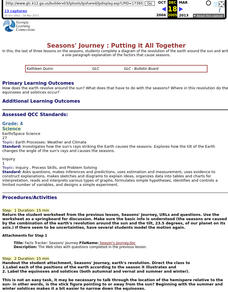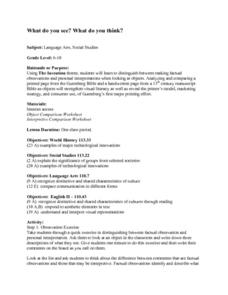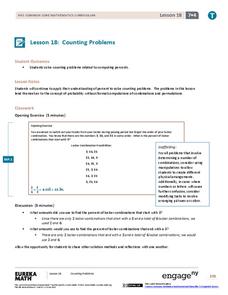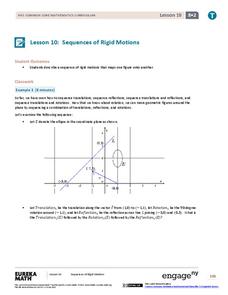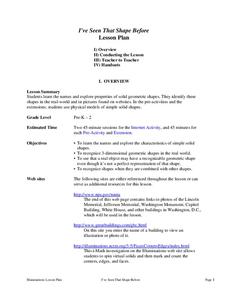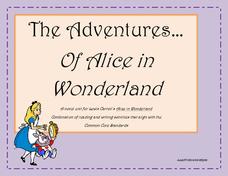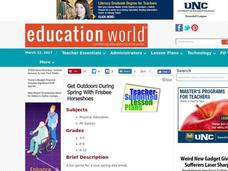Curated OER
Polymers
Students explore online tutorial on polymers. In this chemistry lesson, they create two polymers in the lab and compare their properties. They write a sales letter about their new and improved polymer product.
Curated OER
Learning Birthdays With Chinese Calendar
Students participate in a visual arts lesson that focuses on patterns used in a macaroni necklace that represents the students' birthdays in the Chinese calendar. They compare the Chinese calendar to the one used in America and look at...
Curated OER
Seasons' Journey : Putting it All Together
Third graders complete a diagram of the revolution of the earth around the sun and write a one paragraph explanation of the factors that cause seasons.
Curated OER
"If You Hopped Like a Frog" by David M. Schwartz
Students brainstorm several animal/personal scenarios, select one, and write out an explanation of the comparison. They apply the measurements/characteristics to themselves and use algebraic equations to demonstrate the comparison.
Curated OER
What Do You See? What Do You Think?
Learners review the implications of the printing of the Gutenberg Bible. Using a page from the Bible, they compare and contrast it with one that was handwritten. They use the internet to discover Gutenberg's model and marketing strategy...
Curated OER
Ship-Fish or Fish-Ship
Students read two books about fishing and ships. After viewing portraits, they identify and describe the various types of sailing vessels. They discuss how the artist showed water and detailed the areas around the ships. They create...
Curated OER
Water Hardness- Causes and Testing
Eighth graders examine what materials cause water hardness and the relative measure of water hardness in a two part lab activity. In part one, 8th graders add an assigned soap test solution to eleven different test tube solutions in...
Curated OER
Visual Art: Romare Bearden
Students examine the art of Romare Bearden, focusing on a stained-glass window designed for a New York City elevated railway station. they visit the site and discuss the art after viewing it from various perspectives. Based on their...
Curated OER
A "State of the Arts" Coin K-3
Students recognize the U.S. penny, nickel, dime, and quarter by design, size, and denomination and that the portraits and other images depicted on the coins were designed by artists. They study common Texas symbols and choose one to draw...
Curated OER
iPod Reporters
Students develop a topic for a class newspaper article and set up an interview with someone involved in the issue. They record the interview using an iPod with a voice recorder then use direct quotes for their article. As a whole...
EngageNY
Counting Problems
Solving these percent problems is a matter of counting. Pupils find percents by counting the number of events that meet the criteria and the total number of possibilities. Participants create the ratio and convert it to a percent to...
EngageNY
End of Unit Assessment, Part III: Storyboard Draft, Section 4
Reflection is the best teacher. Using the resource, scholars complete the final part of their end of unit assessment, the fourth section of their storyboard about an invention. Next, they track their progress using a self-reflection...
EngageNY
Sequences of Rigid Motions
Examine the various rigid transformations and recognize sequences of these transformations. The lesson asks learners to perform sequences of rotations, reflections, and translations. Individuals also describe a sequence that results in...
EngageNY
Truncated Cones
Learners examine objects and find their volumes using geometric formulas in the 21st installment of this 25-part module. Objects take the shape of truncated cones and pyramids, and individuals apply concepts of similar triangles to find...
Cornell University
Polymers: Making Silly Putty
Putty is proof that learning can be fun! Share the wonderful world of polymers with your class through an experiment. Young scientists create their own silly putty, then examine its properties.
EngageNY
Distance on the Coordinate Plane
Scholars learn how to find the distance of vertical and horizontal line segments on the coordinate plane in the 19th installment of a 21-part module. The use of absolute value comes in handy.
Fayetteville Public Schools
I've Seen That Shape Before
The objectives in the resource allow young scholars to explore the characteristics of simple solid shapes. Youngsters learn to recognize the face shapes, corners, and edges that make up 3-D figures by filling in a chart....
Stillwater Central School District
The Adventures… Of Alice in Wonderland
Go down the rabbit hole with a thorough novel unit for Lewis Carroll's Alice in Wonderland. With a cause and effect chart, K-W-L organizer, and reading comprehension questions, the resource is a great addition to your summer...
EngageNY
Solving Equations with Radicals
Show learners how to develop a procedure for solving equations using radicals with the fifth lesson of the 25-part module that challenges learners to use properties to solve multi-step quadratic and cubic equations. Individuals round out...
Curated OER
Acrylic "Shingles"
Young artists of all ages create texture using dried slabs of pourable acrylic paint. They experiment with texture by turning a liquid into a solid and finally into a 3-D work of art. This lesson uses easy-to-find materials, and the...
Curated OER
Shoes and the Backyard Landscape
Your shoes get a lot of mileage in familiar places. Represent the places you have traveled the most with an art project based on a print of Indian People Wear Shoes and Socks by Juane Quick-to-See Smith. Kids trace their shoes and...
Curated OER
Shapes and Patterns in Art and Oceans
First graders draw, cut out, and design their own fish shapes by cutting out shapes and putting them together. In this shapes and patterns worksheet, 1st graders also construct a stamp and print patterns with stamps to repeat a...
Curated OER
Frisbee Horseshoes
Students follow directions and practice the skill of throwing a Frisbee toward a target. They then play a Frisbee game and practice working as a team while keeping score on their own.
Curated OER
My Favorite Animal
Students research an animal of choice and create a project. In this animal science lesson, students choose an animal living in the International Peace Park to research. Students write a paper and create a project to present...


